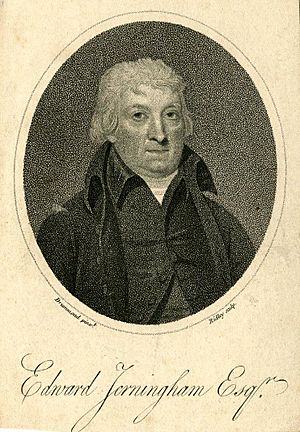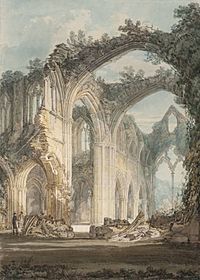Edward Jerningham facts for kids
Edward Jerningham was a well-known poet who lived in important social circles during the late 1700s. He was born in 1737 at Costessey Park, his family's home. He passed away in London on November 17, 1812. He wrote with open-minded views, but later in his life, other writers made fun of him.
His Life
Edward Jerningham was the third son of Sir George Jerningham. His family had lived in Norfolk since the time of the Tudors. Because his family was Roman Catholic, he first studied at the English College in Douai, France. Later, he continued his education in Paris.
In September 1761, Edward came to England. He attended the crowning of King George III. He knew a lot about Greek and Latin. He was also very good at French and Italian. He was interested in religion and looked into the differences between the Anglican Church and the Catholic Church. In the 1790s, he decided to join the Anglican Church. He wrote letters about religion to Anna Seward. Towards the end of his life, he wrote some books about religious ideas.
Edward came from a noble family, so he spent time with important people. His close friends included Lords Chesterfield, Harcourt, and Carlisle. He was also good friends with Horace Walpole, who often called him "the charming man." Edward was also a friend of the Prince Regent, who later became King George IV. The Prince Regent asked Edward to help organize the library at Brighton Pavilion.
Edward's poems were printed many times. He also wrote four plays. These included Margaret of Anjou (1777), the sad play The Siege of Berwick (1794), and the funny plays The Welch Heiress (1795) and The Peckham Frolic: or Nell Gwyn (1799). The first three plays were performed but were not very successful. The last play was never shown. In the theater world, Edward was a special friend of Richard Brinsley Sheridan. However, some say Sheridan made fun of Edward in his play The School for Scandal (1777) by creating the character Sir Benjamin Backbite.
His Poetry
When Edward Jerningham first started writing, he was part of the group around the poet Thomas Gray. Even though he never met Gray, Edward began by writing a poem called "The Nunnery" (1762). This poem was very similar to Gray's famous "Elegy Written in a Country Churchyard."
In the years that followed, Edward wrote other poems with similar themes. These included "The Magdalens: an elegy" (1763), "The Nun: an elegy" (1764), and "An Elegy Written Among the Ruins of an Abbey" (1765). These poems kept a similar style and feeling to Gray's work.
One of Edward's poems, "Yarico to Inkle" (1766), was a type of poem called a heroic epistle. The original story was about an "Indian maid" who saved a sailor after his ship crashed. The sailor then sold her into slavery. Edward's poem changed the story. He made Yarico an African woman. His poem highlighted the unfairness of slavery and how it went against Christian beliefs. This was important because it connected to the growing movement against the slave trade.
Edward's poem "Enthusiasm" shows how his writing was changing. It's a philosophical poem where "Enthusiastic Maid" is judged in heaven. In the first part, she is blamed for bad things like the burning of the Alexandrian library. She is also blamed for the persecution of Protestants in France. In the second part, she is defended. She is shown to inspire good things like self-sacrifice and the signing of Magna Carta. She also inspired people like Christopher Columbus and Martin Luther to challenge old ideas. At the end, she wins the argument by pointing to America's fight for freedom. This idea of freedom would soon be seen as treason after the French Revolution.
Some people liked "Enthusiasm." However, one review said the poem was too plain in explaining its ideas. The poem used many old-fashioned ways of writing. For example, many historical events were hidden in unclear language. The poem also used abstract ideas like "Meek Toleration" and "Superstition."
Edward Jerningham's poem "Tintern Abbey" (1796) is a good example of how his writing connected old styles with new ones. This poem describes the ruins of Tintern Abbey. It's similar to other poems of that time that appreciated the sad beauty of such places. J.M.W. Turner's 1794 painting of the abbey also shows this feeling. Just two years later, William Wordsworth wrote his famous poem "Lines written a few miles above Tintern Abbey" (1798). Wordsworth's poem was very different. He saw the natural world as having a deep, lasting power that spoke to the imagination. This showed a big change in how poets viewed nature.
Being Made Fun Of
Edward Jerningham was a kind person, but sometimes this led to trouble. He twice agreed to write poems for groups of writers who were often laughed at.
First, when he visited Bath, a fashionable town, Lady Anna Miller asked him to contribute to her group's collection of writings. He submitted a poem called "Dissipation." Lady Miller's group was already being made fun of. Luckily, her death in 1781 ended the group before Edward's reputation was badly hurt.
About ten years later, he was asked to help another group called the Della Cruscans. Like Lady Miller's group, they made themselves look silly by praising each other too much. Edward wrote several sonnets under the name 'Benedict.' These were similar to poems exchanged by other members of the group. They were published in a new collection called The British Album (1790).
The Della Cruscans wrote many poems without much thought. They also supported radical political ideas. Because of this, a writer named William Gifford attacked them fiercely in his satire The Baviad (1794). Gifford wrote that "Some sniv’lling Jerningham at fifty weep/ O’er love-lorn oxen and deserted sheep." This made Edward seem like a weak, overly emotional poet. This idea stuck to him for a long time.
One of Edward's friends, John Taylor, said that Gifford clearly did not know Edward's work. Taylor pointed out that Gifford called Edward a "pastoral poet," but Edward had no pastoral poems among his many works. Edward wrote his own satire in response, but his defense is mostly forgotten today. Gifford's misleading words about him are still widely known.
 | Roy Wilkins |
 | John Lewis |
 | Linda Carol Brown |



